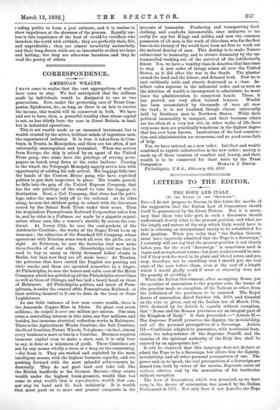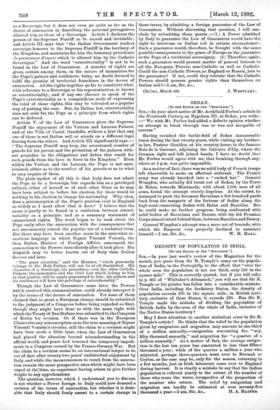LETTERS TO THE EDITOR.
THE POPE AND ITALY.
[To THE EDITOR OP THE "SPECTATOR.")
do not propose to discuss in this letter the merits of the suggestion that the Italian Law of Guarantees should itself be guaranteed by the Great Powers. But it is neces- sary that those who take part in such a discussion should understand clearly what is the present position, and what are the length and nature of the step which Italy would have to take in allowing an international treaty to be substituted for that position. When you write that "the Italian Govern- ment have expressly admitted that the Pope is a Sovereign," I certainly will not say that the present position is not clearly before you, for the word " Sovereign " is sometimes used in vague and metaphorical senses; but your readers would be mis- led if they took the word in its plain and literal sense, and you may, therefore, not be unwilling that I should pat the real state of the case before them, even at the cost of a length which I would gladly avoid if error or obscurity were not the penalty of avoiding it.
When the Italian Government, after occupying Rome, put the question of annexation to the popular vote, the terms of the question made no exception, of the Vatican or other, from the definition of the provinces to be annexed. The Royal decree of annexation, dated October 9th, 1870, and founded on the vote so given, and on the Italian law of March 17th, 1861, declared by its Article I., equally without exception, that "Rome and the Roman provinces are an integral part of the Kingdom of Italy." It then proceeded :— " Article II.— The Supreme Pontiff preserves the dignity, the inviolability, and all the personal prerogatives of a Sovereign. Article IIL—Conditions adapted to guarantee, with territorial fran- chises, the independence of the Supreme Pontiff, and the exercise of the spiritual authority of the Holy See, shall be enacted by an appropriate law."
It will be observed that this language does not declare or
admit the Pope to be a Sovereign, but allows him the dignity, inviolability, and all other personal prerogatives of one. The power and, so to speak, the real prerogatives of a Sovereign are denied him, both by virtue of the maxim, Expressio unius est =hula alterius, and by the annexation of his territories without exception.
The Law of Guarantees, which was promised, as we have seen, in the decree of annexation, was passed by the Italian Parliament in 1871. Not only does it not describe the Pope
as a Sovereign, but it does not even go quite as far as the decree of annexation in describing the personal prerogatives allowed him as those of a Sovereign. Article I. declares the person of the Supreme Pontiff to be sacred and inviolable; and Article III. says that "the Italian Government renders sovereign honours to the Supreme Pontiff in the territory of the Kingdom, and maintains for him the honorary precedence (le preminenze d'onore) which is allowed him by the Catholic Sovereigns." And the word "exterritoriality" is not to be found in the Law of Guarantees. A number of rights are given, certain among them, in the nature of immunities for the Pope's palaces and residences, being no doubt deemed to fulfil the promise of territorial franchises in the decree of annexation. All the rights together go far to constitute what, with reference to a Sovereign or his representatives, is known as exterritoriality; and if any one chooses to speak of the Pope's exterritoriality as a compendious mode of expressing the total of those rights, this may be tolerated as a popular way of putting the case. But, by Italian law, exterritoriality does not exist for the Pope as a principle from which rights can be deduced.
Article V. of the Law of Guarantees gives the Supreme Pontiff the enjoyment of the Vatican and Lateran Palaces, and of the Villa of Castel Gandolfo, without a hint that any one of these is not Italian soil, or stands on a different legal footing from the others. And Article III. significantly says :— "The Supreme Pontiff may keep the accustomed number of guards for his person and the protection of the palaces, with- out prejudice to the obligations and duties that result for such guards from the laws in force in the Kingdom." Even within the Vatican and the Lateran, the Pope is not unre- strained, either as to the number of his guards or as to what he may require of them.
The plain upshot of all this is that Italy does not admit the Pope to be a Sovereign, but regards him as a privileged subject, either of herself or of such other State as he may have been subject to before his election, for there would be nothing in his election to change his nationality. Why, then, does a misconception of the Pope's position exist in England so widely as I must allow that it does? I believe that the cause is partly to be found in a confusion between exterri- toriality as a principle, and as a summary statement of enumerated rights. The word began to be used about the Pope early after the annexation, with the consequences that not uncommonly attend the popular use of a technical term. But there may have been another cause in the somewhat in- cautious language in which Signor Visconti Venosta, the then Italian Minister of Foreign Affairs, announced the annexation to the Powers immediately after it took place. His despatch may be better known out of Italy than Italian decrees and laws.
"The great situation," said the Minister, "which personally belongs to the Holy Father, will not be at all diminished. His character of a Sovereign, his precedence over •the other Catholic Princes, the immunities and the Civil List which belong to him in that quality, will be amply guaranteed to him; his palaces and his residences will have the privilege of exterritoriality."
Though the Law of Guarantees came later, the Powers which received this communication could already interpret it by the terms of the decree of annexation. Yet none of them claimed that so great a European change should be submitted to the judgment of a Congress before being regarded as final, though they might have done so with the same right with which the Treaty of San Stefano was submitted to the Congress of Berlin for revision. Or if there was in the European Chanceries any misconception as to the true meaning of Signor Visconti Venosta's circular, still the claim to a revision might have been made a little later, when the Law of Guarantees had placed the situation beyond misunderstanding in the official world, and peace had removed the temporary impedi- ment to a Congress caused by the Franco-German War. But the claim to a revision seems to an international lawyer to be out of date after twenty-two years' undisturbed enjoyment by Italy, and while the inconveniences to result from the annexa- tion remain the same prospective ones which might have been urged at the:time, no experience having arisen to give further weight to any apprehensions.
The question, however, which I understand you to discuss, is not whether a Power foreign to Italy could now demand a revision of the terms of annexation, but whether it is desir- able that Italy should freely assent to a certain change in those terms, by admitting a foreign guarantee of the Law of Guarantees. Without discussing that question, I will con- clude by submitting these points :—(1.) A Power admitted by Italy to guarantee the Law of Guarantees would have the right to intervene on Italian soil in certain circumstancer.. Such a guarantee would, therefore, be fraught with the same possible consequences to the peace of Europe as the guarantee to the Pope of a territorial sovereignty. (2.) Therefore, again, such a guarantee would present matter of general interest to all the European Powers, non-Catholic as well as Catholic Could the non-Catholic Powers, as England or Russia, join in the guarantee ? If not, could they tolerate that the Catholic Powers should possess greater rights than themselves on Italian soil P—I am, Sir, &c.,



































 Previous page
Previous page